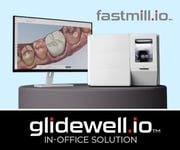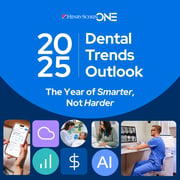The business world recently woke up to a sudden dramatic drop in Google Business Profile review counts. Our DSO clients and many businesses across the Google ecosystem have reported losing a significant number of reviews, including 5-star reviews. So, what gives? We have to understand Google as an entity that remains opaque and lacks transparency. Google Reviews is an automated system that prioritizes scalability over precision to manage billions of reviews, so we must first recognize that we are dealing with a fundamentally imperfect system.
Of course, no one wants their reviews to be dropped or throttled, so the wide range of reactions is understandable. From deep concerns to downright panic, this issue seemingly hit an emotional chord with dental practices and businesses, but I’m here to tell you not to worry about any of this. Here are three reasons why:
1. Because They Can - I know that the latter part is tough to read, but it’s the truth. Officially, Google is citing “technical glitches.” The truth is, no one knows, and Google in fact can seemingly do whatever it wants despite its terms and conditions because of its size, money, and monopoly in the space, in my opinion. Google owns the market, so businesses have no other options. Regulators are trying to catch up to Google and Big Tech, but with their unprecedented prominent presence at the inauguration of President Trump, I doubt there could be much movement or inclination to address the concerns of business and consumers. Everyone should remember that Google has not exactly been a good nor transparent business partner to dental practices or businesses across the board. Millions, if not hundreds of millions of dollars are lost each year into the digital advertising abyss. Don’t take my word for it, simply Google what I’ve referenced and see for yourself. You’ll be astonished. To put it in perspective, Google has paid over $1.5 billion in fines and settlements in the United States alone since 2011 against a market cap of $2.2 trillion. Chump change for no change. So, if the old saying in Washington D.C. “personnel is policy” holds, Google will continue business as usual.

2. Overreliance on Digital - Even in today’s hyper digital world, about 65%-70% of new patients still come from word of mouth and other marketing strategies, leaving the rest to digital and everything else. Overreliance on everything digital exposes dental practices to marketing and business risks. Remember, the only digital property you own is your website. Everything else, including Google and every social media property, is not yours. So, these platforms can ostensibly do whatever they want. As the old saying in Silicon Valley goes, “If you’re not paying for the product, you are the product.” So be prepared by making sure your marketing is operating within an integrated marketing framework to give you more of an advantage and introduce derisking into your business growth calculus.
SPONSORED
|

|
Why DSOs Love glidewell.io™
The glidewell.io™ In-Office Solution offers affordable, AI-driven digital dentistry with same-day BruxZir® crowns, and intuitive design software. With in-office training, support, and financing options, it’s the perfect solution for DSOs to enhance their practice.

|
3. Diminishing Returns After a “Trust Threshold”
Google reviews matter most when they help a practice cross a “psychological trust threshold.” For example:
- A practice with 0 reviews is often seen as risky or unproven.
- A practice with 10–20 reviews starts to build credibility.
- At 50+ reviews, customers often perceive the practice as established.
- Beyond 100+ reviews, the marginal benefit of each additional review decreases because the practice has already crossed the “trust barrier.”
At this point, factors like average star rating, review quality, and recency become more critical than sheer volume. For instance, a practice with 500 reviews and a 3.8-star average may lose trust faster than one with 100 reviews and a 4.9-star average. User behavior matters. Let’s not forget short attention spans. Many prospective patients glance at the average star rating and skim the first 5–10 reviews. If those are negative or generic, they may not dig deeper. Filtering by “Most Recent” is another important phenomenon. Users increasingly check recent reviews to gauge consistency. A practice with 200 reviews but recent 1-star feedback may lose trust.
SPONSORED
|

|
The Future of Dentistry
The dental industry is quickly evolving. Our exclusive 2025 Dental Trends Outlook reveals what to expect in the coming year, backed by real data and expert insights with actionable steps to help you succeed.

|
In an era where digital visibility is synonymous with survival, Google’s unchecked authority over online ecosystems underscores a sobering reality: DSOs and dental practices are at the mercy of a platform that operates by its own opaque rules (this includes other digital platforms like Meta). Algorithm updates can erase search rankings, policy shifts can purge legitimate reviews, and account suspensions can dismantle years of reputation-building—all without meaningful transparency or recourse.
This power imbalance exposes the peril of overreliance on a single gatekeeper. While Google’s tools offer unparalleled reach, they also demand a precarious trade-off: ceding control of a business’s digital fate to an entity with no obligation to prioritize fairness or consistency. To mitigate this risk, DSOs and dental practices must diversify their strategies—cultivating direct customer relationships, investing in owned platforms, and decentralizing their online presence. In doing so, they reclaim agency, ensuring their survival isn’t held hostage by the whims of an algorithm. The lesson is clear: use Google and other digital platforms strategically but never depend on them.
SPONSORED
|

|
Interested in the DSO Market?
DSO DataCONNECT tracks more than 3,100 dental organizations with 3 practice locations or more - representing more than 90,000 corporate employees and dentists. Data includes a combination of contact information, PE Support, Procedural Codes, and Org Chart relationships.

|
More from the Newsletter
About Abe Kasbo
.jpg?width=150&height=181&name=AM_L1938%20copy%20(1).jpg) Abe Kasbo is Founder and CEO of Verasoni, a marketing communications advisory, consultancy, and agency. Founded in 2005, this innovative firm delivers meaningful, integrated marketing communications strategies to Fortune 500, middle-market, and startup clients in the United States and around the world. Verasoni serves the dental market including DSOs, distributors, manufacturers, and consultants. Abe is a sought-after advisor to C-Suite executives on strategic communications, branding, and public relations strategies.
Abe Kasbo is Founder and CEO of Verasoni, a marketing communications advisory, consultancy, and agency. Founded in 2005, this innovative firm delivers meaningful, integrated marketing communications strategies to Fortune 500, middle-market, and startup clients in the United States and around the world. Verasoni serves the dental market including DSOs, distributors, manufacturers, and consultants. Abe is a sought-after advisor to C-Suite executives on strategic communications, branding, and public relations strategies.
He is immediate past Chair and current board member of the Center of Innovation & Entrepreneurial Studies at Seton Hall University. He served as Community Board Member for The Walt Disney Company’s live action movie, “Aladdin” starring Will Smith. He was inducted into the Seton Hall University Entrepreneur Hall of Fame in September 2018 and holds a master’s degree in public administration (Healthcare Policy & Management) and a Bachelor of Arts in Political Science from Seton Hall University.
Abe is the author of the upcoming book, Irresponsibly Digital. He is featured in media including The New York Times, Forbes, Institutional Investor, e-Marketer, PBS, Insider Intelligence, Bankrate.com, Dental Economics, FOX, Becker’s Dental Review, and international media in Europe and the Middle East. He has spoken at Princeton University, Fordham University, Yale University, the University of Michigan, Rice University, and Temple University, among others, and is a sought-after speaker on marketing and business topics including digital transformation, ecommerce, digital and social media, and business competitiveness.
Verasoni
Verasoni is a fiercely independent marketing consultancy, advisory, and agency that delivers critical, meaningful, integrated marketing communications strategies and campaigns to clients in the United States and around the globe. Verasoni has served the dental industry since 2007 and DSOs specifically since 2010.
Verasoni enjoys a well-earned reputation as leaders in marketing who serve as trusted partners and advisors to our clients with honesty and transparency. Visit Verasoni.com and follow on LinkedIn to learn more.
